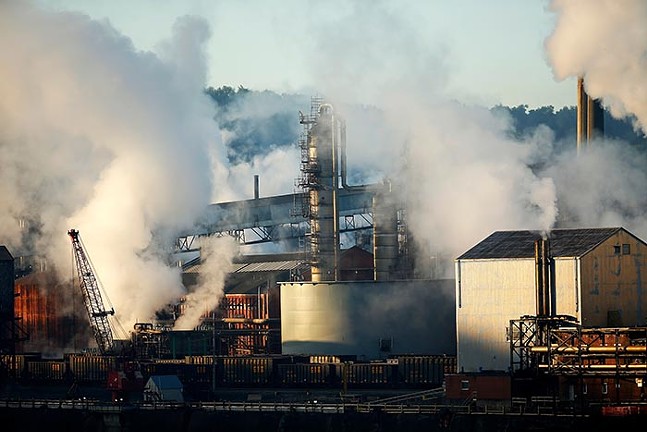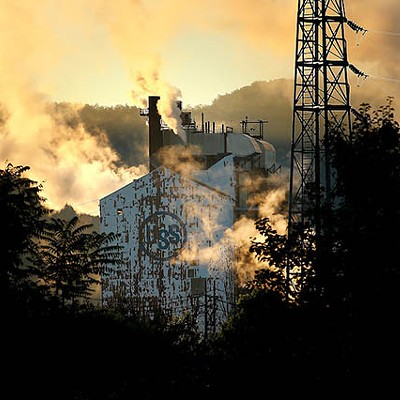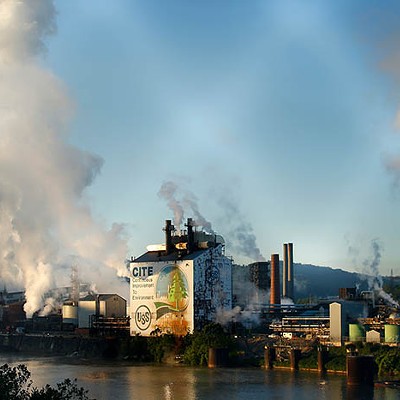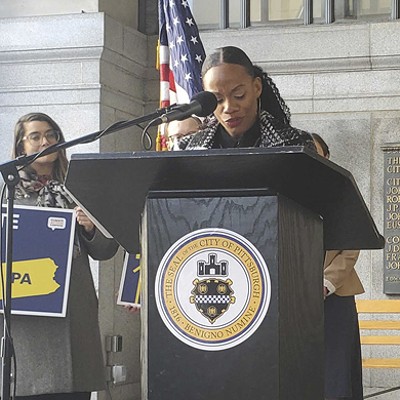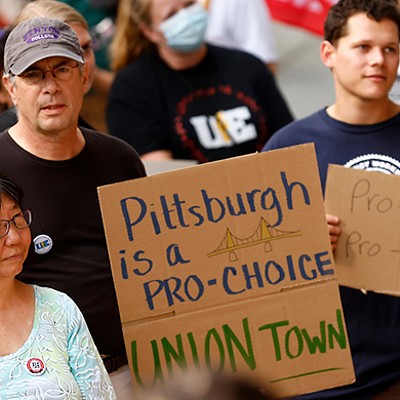U.S. Steel is challenging an Allegheny County proposed air quality regulation
On Dec. 24, 2018, part of Clairton Coke Works caught fire and knocked out the pollution controls at the U.S. Steel facility, causing the surrounding Mon Valley’s air quality to plummet to dangerous levels. Studies have shown the pollution from the fire led to exacerbated asthma rates among residents, including increasing the number of hospital emergency department visits by asthma sufferers in the Clairton area to nearly double following the fire.
U.S. Steel notes that before the studies were released, the Allegheny County Health Department's chief epidemiologist testified that there was no connections between the fire and increase in emergency room visits, and the company agrees with those findings.
However, six months later, a second fire hit the coke works, and air pollution control devices were again suspended. In the aftermath of the the fires, the Allegheny County Health Department started to take a harder line against U.S. Steel. Prior to these incidents, wasn’t always apt to enforce air quality regulations.
ACHD, which has the authority to doll out fines and regulations concerning public health in Allegheny County, took action against U.S. Steel with an enforcement order and fines; eventually, the two parties reached a settlement in 2019 that was related to ongoing emission issues at the Mon Valley Facility, not necessarily that fires. That settlement included $200 million in plant improvements, annual environmental audits for five years, annual reports of the company’s environmental improvements, and an established Community Benefit Trust for affected Mon Valley communities.
However, amid U.S. Steel’s apparent desire to turn over a new leaf, it is challenging a proposed air pollution regulation. In a legal brief filed on Sept. 9, the steel company is arguing that proposed regulations related to the settlement are not applicable to Clairton Coke Works’ coke oven batteries.
To many who have been fighting for better air quality in the Pittsburgh region, it is just another chapter in U.S. Steel’s long history of fighting against air pollution regulations. And to the air quality advocates at the Group Against Smog and Pollution, it’s another disappointment in the face of recent statements U.S. Steel has made about wanting to become a more environmentally friendly company. In April, when U.S. Steel announced canceling expansion plans for facilities in the Mon Valley, U.S. Steel CEO David Burritt said part of the reason was the company’s desire to become carbon neutral by 2050.
“They like to come across as a good corporate citizen and they want to clean up in the act, but when it comes down to it, they are fighting that effort,” says GASP director Rachel Filippini.
U.S. Steel’s argument against ACHD, according to the legal brief, is that there is “no reasonable dispute” the proposed hydrogen sulfide emission standards for the coke works’ ovens are more stringent than the current standards, and, therefore, shouldn’t be applied.
“ACHD agreed that it would not impose more stringent limits for coke ovens unless it first determines that the limits were technically feasible and based on specific criteria in the [settlement agreement] and the rulemaking is shown to correlate with a measurable reduction in benzene and hydrogen sulfide at the nearby Liberty Monitor,” reads the brief.
In a statement sent to Pittsburgh City Paper, U.S. Steel says the air quality regulation proposed by the ACHD is doesn't contain the required analysis agreed as part of the 2019 settlement, and that the county needs to demonstrate the proposed regulations are "technically feasible and will measurably improve the environment."
“U.S. Steel and ACHD were able to reach agreement on other contested issues in the proposed regulations during periods of informal and formal dispute resolution," reads the statement. "Unfortunately, we are at an impasse on portions of ACHD’s proposed coke oven regulation changes, therefore, we have filed a petition for review of proposed coke oven rule changes with the Hearing Officer for ACHD in accordance with the 2019 Settlement Agreement. We hope to continue to work with ACHD to move toward a resolution.”
Allegheny County Health Department Spokesperson Chris Togneri says the department can’t comment on ongoing legal matters.
However, GASP wrote on its blog that “ACHD has maintained that it can indeed impose more stringent limits — that, in fact, it is required by law to do just that.”
Filippini notes that there have already been 35 hydrogen sulfide violations this year at ACHD's Liberty monitor. There have also been 12 exceedances at the North Braddock monitor. The exceedances at the Liberty monitor have already outpaced last year’s exceedances and will likely reach pre-COVID levels by the end of the year.
“They already have 35 violations this year with four months left to go,” says Filippini. “It is a public health issue, and a quality of life issue.”
Hydrogen sulfide is not a greenhouse gas, though coke ovens do produce those as well, and it usually produces a noxious smell that can reach most parts of Allegheny County. Hydrogen sulfide is also referred to as H2S, as well as sewer gas, swamp gas, stink damp, and sour damp. According to the Centers for Disease Control, acute exposure of H2S can result in nausea, headaches, disturbed equilibrium, and skin and eye irritation. Repeated or prolonged exposure has been reported to cause low blood pressure, headache, nausea, eye-membrane inflammation, and chronic cough.
U.S. Steel says there are 28 potential sources of H2S that can contribute to smells in the 10-mile radius around the Liberty monitor, including sewage treatment facilities and several solid waste landfills.
Part of U.S. Steel’s cancellation plans include taking three of Clairton Coke Works’ most polluting batteries offline, which should improve regional air quality. But Filippini says those moves are not immediate, and the H2S violations are something that need to be addressed immediately.
“It is not a problem that we can kick down the road because it is affecting us right now,” says Filippini. “It is just frustrating that this has gone on so long. And the health department's attempt to rectify the problem is being stymied and delayed by U.S. Steel.”
Editor's note: The original version of this story stated that U.S. Steel didn't respond to an inquiry, but the company has responded and that information has been added to the article.
U.S. Steel notes that before the studies were released, the Allegheny County Health Department's chief epidemiologist testified that there was no connections between the fire and increase in emergency room visits, and the company agrees with those findings.
However, six months later, a second fire hit the coke works, and air pollution control devices were again suspended. In the aftermath of the the fires, the Allegheny County Health Department started to take a harder line against U.S. Steel. Prior to these incidents, wasn’t always apt to enforce air quality regulations.
ACHD, which has the authority to doll out fines and regulations concerning public health in Allegheny County, took action against U.S. Steel with an enforcement order and fines; eventually, the two parties reached a settlement in 2019 that was related to ongoing emission issues at the Mon Valley Facility, not necessarily that fires. That settlement included $200 million in plant improvements, annual environmental audits for five years, annual reports of the company’s environmental improvements, and an established Community Benefit Trust for affected Mon Valley communities.
However, amid U.S. Steel’s apparent desire to turn over a new leaf, it is challenging a proposed air pollution regulation. In a legal brief filed on Sept. 9, the steel company is arguing that proposed regulations related to the settlement are not applicable to Clairton Coke Works’ coke oven batteries.
To many who have been fighting for better air quality in the Pittsburgh region, it is just another chapter in U.S. Steel’s long history of fighting against air pollution regulations. And to the air quality advocates at the Group Against Smog and Pollution, it’s another disappointment in the face of recent statements U.S. Steel has made about wanting to become a more environmentally friendly company. In April, when U.S. Steel announced canceling expansion plans for facilities in the Mon Valley, U.S. Steel CEO David Burritt said part of the reason was the company’s desire to become carbon neutral by 2050.
“They like to come across as a good corporate citizen and they want to clean up in the act, but when it comes down to it, they are fighting that effort,” says GASP director Rachel Filippini.
U.S. Steel’s argument against ACHD, according to the legal brief, is that there is “no reasonable dispute” the proposed hydrogen sulfide emission standards for the coke works’ ovens are more stringent than the current standards, and, therefore, shouldn’t be applied.
“ACHD agreed that it would not impose more stringent limits for coke ovens unless it first determines that the limits were technically feasible and based on specific criteria in the [settlement agreement] and the rulemaking is shown to correlate with a measurable reduction in benzene and hydrogen sulfide at the nearby Liberty Monitor,” reads the brief.
In a statement sent to Pittsburgh City Paper, U.S. Steel says the air quality regulation proposed by the ACHD is doesn't contain the required analysis agreed as part of the 2019 settlement, and that the county needs to demonstrate the proposed regulations are "technically feasible and will measurably improve the environment."
“U.S. Steel and ACHD were able to reach agreement on other contested issues in the proposed regulations during periods of informal and formal dispute resolution," reads the statement. "Unfortunately, we are at an impasse on portions of ACHD’s proposed coke oven regulation changes, therefore, we have filed a petition for review of proposed coke oven rule changes with the Hearing Officer for ACHD in accordance with the 2019 Settlement Agreement. We hope to continue to work with ACHD to move toward a resolution.”
Allegheny County Health Department Spokesperson Chris Togneri says the department can’t comment on ongoing legal matters.
However, GASP wrote on its blog that “ACHD has maintained that it can indeed impose more stringent limits — that, in fact, it is required by law to do just that.”
Filippini notes that there have already been 35 hydrogen sulfide violations this year at ACHD's Liberty monitor. There have also been 12 exceedances at the North Braddock monitor. The exceedances at the Liberty monitor have already outpaced last year’s exceedances and will likely reach pre-COVID levels by the end of the year.
“They already have 35 violations this year with four months left to go,” says Filippini. “It is a public health issue, and a quality of life issue.”
Hydrogen sulfide is not a greenhouse gas, though coke ovens do produce those as well, and it usually produces a noxious smell that can reach most parts of Allegheny County. Hydrogen sulfide is also referred to as H2S, as well as sewer gas, swamp gas, stink damp, and sour damp. According to the Centers for Disease Control, acute exposure of H2S can result in nausea, headaches, disturbed equilibrium, and skin and eye irritation. Repeated or prolonged exposure has been reported to cause low blood pressure, headache, nausea, eye-membrane inflammation, and chronic cough.
U.S. Steel says there are 28 potential sources of H2S that can contribute to smells in the 10-mile radius around the Liberty monitor, including sewage treatment facilities and several solid waste landfills.
Part of U.S. Steel’s cancellation plans include taking three of Clairton Coke Works’ most polluting batteries offline, which should improve regional air quality. But Filippini says those moves are not immediate, and the H2S violations are something that need to be addressed immediately.
“It is not a problem that we can kick down the road because it is affecting us right now,” says Filippini. “It is just frustrating that this has gone on so long. And the health department's attempt to rectify the problem is being stymied and delayed by U.S. Steel.”
Editor's note: The original version of this story stated that U.S. Steel didn't respond to an inquiry, but the company has responded and that information has been added to the article.

